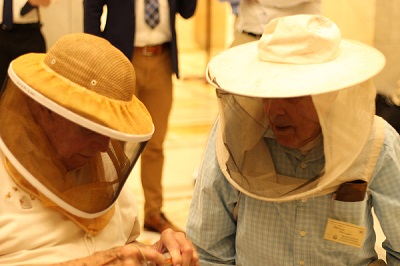Bee Supporters seek House vote on H-4041
National Pollinator Protection Week

Members of the Worcester County Bee Keepers Association
BOSTON ??? Supporters of H-4041, An Act to Protect Massachusetts Pollinators, sponsored by Rep. Carolyn Dykema (Holliston) and Senator Jamie Eldridge (Acton) urged House leaders??this week to move the bill onto the House floor for a vote as soon as possible. The bill would put??common sense restrictions on the use of virulent neonicotinoid (neonics) pesticides, shown by hundreds of peer-reviewed scientific studies to harm bees and other pollinators.
The bill, on its second time through the legislative process has picked up much more support than is had last session. This includes 135 legislative co-sponsors from both parties in both the House and the Senate. The bill???s primary feature is restricting the use of neonics to licensed pesticide applicators, who know how, how much, and when to use these chemicals without poisoning pollinators. Currently the bill is in the House Ways and Means Committee, having received a unanimous endorsement from the Joint Committee on Environment, Natural Resources and Agriculture.
Additional supporters include more than 80 businesses, land trusts, horticultural, environmental, farming and bee keeping organizations. More than 100 Massachusetts scientists and academics signed a letter supporting the bill. More than 100 legislators, some of whom did not sign on as original cosponsors, signed a letter to House Ways and Means Chairman Jeffrey Sanchez asking him to let them vote on the bill. And the Massachusetts Medical Association last month passed a resolution raising concern about human health impacts of neonics.
???If we don???t do something now to protect bees and other pollinators from these chemicals, we risk losing our ability to sustain bee colonies, which provide us with one-third of every bite of food we eat,??? said Kathryn deGraaf, President of the Worcester County Beekeepers Association. ???While bees face a multitude of problems, neonics weaken their ability to fight off varroa mites and inhibit their ability to navigate to forage and get back to their hives.???
“This commonsense law would not stop farmers from using this pesticide if they have a pesticide applicator license,” said Christy Raymond a farmer with NOFA/Mass, who left her farm in Wrentham in the middle of June to speak at the State House in favor of the Pollinator Protection Act. The law would restrict use to those who are trained to minimize impacts on pollinators.??
???Our public health is threatened by the widespread use of harmful pesticides called neonicotinoids, which are killing our pollinators. The problem is simple: without bees, we have no food,??? said Deirdre Cummings, Legislative Director of MASSPIRG.
To date, Connecticut and Maryland have passed similar bills and Vermont is considering following suit. The European Union has banned neonics from all outdoor agricultural uses.
???I want to thank you all for coming here today and for your continuous support for this bill for the last four years,??? said Rep. Dykema. ???When this bill passes you will have made a major impact for sustainable agriculture that will reverberate for decades.???
Following the Bee Briefing at the State House on Wednesday to call attention to the need to pass H-4041, supporters fanned out across the State House meet with individual legislators and their staffs to argue for an up or down floor vote.
Sponsors of the Event: Environment Massachusetts, Friends of the Earth, MASSPIRG, New England Wildflower Society, Northeast Organic Farming Association Massachusetts, Plymouth County Beekeepers Association, Toxics Action Center, Worcester County Beekeepers Association.
